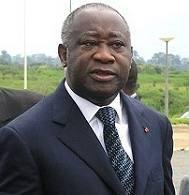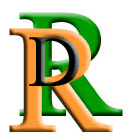| |||||
| Decades: | |||||
|---|---|---|---|---|---|
| See also: | |||||
The following lists events that happened during 2011 in Ivory Coast .
| |||||
| Decades: | |||||
|---|---|---|---|---|---|
| See also: | |||||
The following lists events that happened during 2011 in Ivory Coast .

Koudou Laurent Gbagbo is an Ivorian politician who was the President of Côte d'Ivoire from 2000 until his arrest in April 2011. A historian, Gbagbo was imprisoned in the early 1970s and again in the early 1990s, and he lived in exile in France during much of the 1980s as a result of his union activism. Gbagbo founded the Ivorian Popular Front (FPI) in 1982 and ran unsuccessfully for president against Félix Houphouët-Boigny at the start of multi-party politics in 1990. He won a seat in the National Assembly of Côte d'Ivoire in 1990.

The Rally of the Republicans is a liberal party in Ivory Coast. The party is the country's governing party; the party's leader, Alassane Ouattara, is the current President of Ivory Coast.

The First Ivorian Civil War was a conflict in the Ivory Coast that began in 2002. Although most of the fighting ended by late 2004, the country remained split in two, with a rebel-held north and a government-held south. Hostility increased and raids on foreign troops and civilians rose. As of 2006, the region was tense, and many said the UN and the French military failed to calm the civil war.

Alassane Dramane Ouattara is an Ivorian politician who has been President of Ivory Coast since 2010. An economist by profession, Ouattara worked for the International Monetary Fund (IMF) and the Central Bank of West African States, and he was the Prime Minister of Côte d'Ivoire from November 1990 to December 1993, appointed to that post by President Félix Houphouët-Boigny. Ouattara became the President of the Rally of the Republicans (RDR), an Ivorian political party, in 1999.

Ibrahim Coulibaly was a military and rebel leader in Côte d'Ivoire. A Staff Sergeant in the Armed Forces of Côte d'Ivoire, Coulibaly had served since at least the early 1990s. As Côte d'Ivoire slid into communal conflict, Coulibaly joined the 1999 coup led by Robert Guéï. A second coup, following 2000 elections that made Laurent Gbagbo President, saw Coulibaly in a leadership position, after which he came into conflict with fellow military leader Guillaume Soro. During the ensuing eight years of division in the country, Coulibaly came into conflict with both sides, eventually returning to lead an Abidjan-based militia supportive of Alassane Ouattara. Following the end of fighting, Coulibaly was killed in Abidjan by Ouattara's forces during an attempt to disarm his group. Known popularly as "IB", he was 47 years old at the time of his death.

The United Nations Operation in Côte d'Ivoire (UNOCI) was a UN-NATO peacekeeping mission in Ivory Coast whose objective was "to facilitate the implementation by the Ivorian parties of the peace agreement signed by them in January 2003". The two main Ivorian parties here are the Ivorian Government forces who control the south of the country, and the New Forces, who control the north. The UNOCI mission aims to control a "zone of confidence" across the centre of the country separating the two parties. The Head of Mission and Special Representative of the Secretary-General is Aïchatou Mindaoudou Souleymane from Niger. She has succeeded Bert Koenders from the Netherlands in 2013 who himself succeeded Choi Young-jin from South Korea in 2011. The mission officially ended on 30 June 2017.

Opération Licorne was the name of the French Armed Forces's peacekeeping operation in support of the United Nations Operation in Côte d'Ivoire. The French forces have been stationed in the country since shortly after the outbreak of the Ivorian Civil War. The troops' main mission was to support the United Nations peacekeeping mission and to ensure the security of French and foreign nationals.

In 2004, an armed conflict took place between France and Côte d'Ivoire. On 6 November 2004, Ivorians launched an air attack on French peacekeepers in the northern part of Côte d'Ivoire who were stationed there as part of Opération Licorne (Unicorn), the French military operation in support of the United Nations Operation in Côte d'Ivoire (UNOCI). French military forces subsequently clashed with Ivorian troops and government-loyal mobs, destroying the entire Ivorian Air Force. Those incidents were followed by massive anti-French protests in Côte d'Ivoire.
Simone Ehivet Gbagbo is an Ivorian politician. She is the President of the Parliamentary Group of the Ivorian Popular Front (FPI) and is a Vice-President of the FPI. As the wife of Laurent Gbagbo, the President of Côte d'Ivoire from 2000 to 2011, she was also First Lady of Ivory Coast prior to their arrest by pro-Ouattara forces.

Presidential elections were held in Ivory Coast in 2010. The first round was held on 31 October, and a second round, in which President Laurent Gbagbo faced opposition leader Alassane Ouattara, was held on 28 November 2010. Originally scheduled to be held in 2005, the vote was delayed several times due to the Ivorian Civil War and difficulties involved in the organization and preparation of the elections. A peace agreement between the government and the former rebel New Forces was signed on 4 March 2007, and in late April 2009, it was announced that the elections would be held by 6 December 2009, and that the date would be announced shortly. On 15 May 2009, the date was announced to be 29 November 2009. On 11 November, the elections were postponed again due to delays in the electoral roll. It was announced on 3 December 2009 to be held in late February or early March 2010.

Parliamentary elections were held in Ivory Coast on 11 December 2011, after the presidential elections in late 2010. They followed a peace agreement between the government and the New Forces that was signed in March 2007. The Rally of the Republicans, the party of President Alassane Ouattara, won just under half the seats in the National Assembly.

The 2010–11 Ivorian crisis was a political crisis in Ivory Coast which began after Laurent Gbagbo, the President of Ivory Coast since 2000, was proclaimed the winner of the Ivorian election of 2010, the first election in the country in 10 years. The opposition candidate, Alassane Ouattara, and a number of countries, organisations and leaders worldwide claimed Ouattara had won the election. After months of attempted negotiation and sporadic violence, the crisis entered a decisive stage as Ouattara's forces began a military offensive in which they quickly gained control of most of the country and besieged key targets in Abidjan, the country's largest city. International organizations have reported numerous human rights violations, and the UN undertook its own military action with the stated objective to protect itself and civilians.

The Second Ivorian Civil War broke out in March 2011 when the crisis in Ivory Coast escalated into full-scale military conflict between forces loyal to Laurent Gbagbo, the President of Ivory Coast since 2000, and supporters of the internationally recognised president-elect Alassane Ouattara. After months of unsuccessful negotiations and sporadic violence between supporters of the two sides, the crisis entered a critical stage as Ouattara's forces seized control of most of the country with the help of the UN, with Gbagbo entrenched in Abidjan, the country's largest city. International organizations have reported numerous instances of human rights violations by both sides, in particular in the city of Duékoué where Ouattara's forces killed hundreds of people. Overall casualties of the war are estimated around 3000. The UN and French forces took military action, with the stated objective to protect their forces and civilians. France's forces arrested Gbagbo at his residence on 11 April 2011.

United Nations Security Council Resolution 1975, adopted unanimously on March 30, 2011, after recalling previous resolutions on the situation in Côte d'Ivoire, including resolutions 1572 (2004), 1893 (2009), 1911 (2010), 1924 (2010), 1933 (2010), 1942 (2010), 1946 (2010), 1951 (2010), 1962 (2010), 1967 (2011) and 1968 (2011), the Council demanded that Laurent Gbagbo step down as President and imposed sanctions on him and his close associates.
Aya Virginie Touré, born Aya Virginie Kouamé, is a peace activist and politician in Côte d'Ivoire. She became known for organizing women in nonviolent resistance against President Laurent Gbagbo who refused to step down since he lost the presidential election to Alassane Ouattara. Touré worked to mobilize women as the Deputy Director for Ouattara's 2010 Ivorian presidential election. In 2016, she was elected as a deputy in the 72nd circonscription which includes the cities of Guépahouo and Oumé. Since at least 2014, she has been the Executive Director of the Petroci Foundation, the caritative organization of the Ivorian oil and gas company.

Désiré Asségnini Tagro was an Ivorian politician who served as the Minister of the Interior and chief of staff for Ivorian President Laurent Gbagbo during the 2010–2011 Ivorian crisis. Tagro was a top ally of Gbagbo.
Rose Doudou Guéï was wife of the Head of State of Cote d'Ivoire, Robert Guéï, and consequently First Lady of Ivory Coast from 1999 to 2000.
The following lists events that happened during 2010 in Ivory Coast.
The Constitutional Council is a judicial body in the government of Ivory Coast that is patterned after the Constitutional Council of France. The Council was created by law in 1994 and began its operations in 1995. The seat of the Council is in Abidjan.

Canada–Ivory Coast relations refers to the diplomatic relations between Canada and Ivory Coast. Both nations are members of the Organisation internationale de la Francophonie.